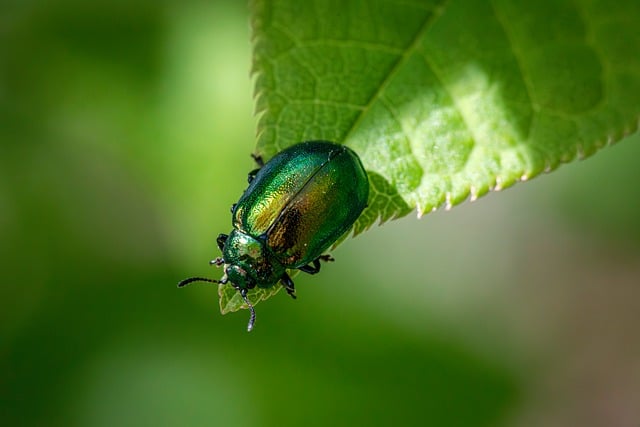In Castle Rock, sustainable pest management for vegetable gardens focuses on eco-friendly strategies to control ants, roaches, mice, and spiders, minimizing synthetic chemicals. This involves introducing beneficial insects, companion planting with herbs like mint, basil, and rosemary, maintaining healthy soil through organic matter and composting, regular monitoring, and using non-toxic solutions like neem oil or garlic spray. A holistic approach combining prevention, monitoring, and natural deterrents significantly reduces infestation risks, fostering a healthier ecosystem and protecting both the environment and produce.
In the heart of any home, the kitchen is a bustling hub where food preparation meets storage. However, it’s also a common breeding ground for pests, from ants and rodents to spiders and flies. Understanding these common kitchen pests and their behaviors is the first step towards effective elimination. This article explores sustainable pest management strategies specifically tailored for vegetable gardens in Castle Rock, offering safe yet effective techniques to keep your kitchen pest-free.
- Understanding Common Kitchen Pests and Their Behavior
- Sustainable Pest Management Strategies for Vegetable Gardens
- Effective Yet Safe Pest Elimination Techniques for Castle Rock Residents
Understanding Common Kitchen Pests and Their Behavior

In the heart of any home, especially a kitchen, pests can find their way in and quickly become a nuisance. Understanding common kitchen pests like ants, roaches, mice, and spiders is the first step towards effective sustainable pest management for vegetable gardens in Castle Rock. These intruders are not only a health hazard but also disrupt the harmony of your space.
Each pest has unique behaviors that impact their presence in kitchens. Ants, for instance, are drawn to sweet substances and can trail through cracks to find food sources, while roaches prefer dark, humid areas and multiply rapidly behind walls or under appliances. Mice seek warmth and shelter, often entering through small openings, and spiders build webs in corners or along ceilings. Recognizing these behaviors allows homeowners to implement tailored strategies using eco-friendly methods for a more sustainable approach to pest control.
Sustainable Pest Management Strategies for Vegetable Gardens

In Castle Rock, sustainable pest management for vegetable gardens is a holistic approach that combines natural methods with minimal use of synthetic chemicals. One effective strategy involves introducing beneficial insects such as ladybugs and lacewings that feed on garden pests like aphids and mealybugs. Companion planting, where certain vegetables are grown together to deter pests, is another eco-friendly technique. Herbs like mint, basil, and rosemary naturally repel common pests due to their strong scents.
Moreover, maintaining a healthy soil ecosystem through organic matter and composting enhances plants’ natural defenses against pests and diseases. Regular monitoring of crops allows for early detection of pest activity, enabling timely intervention with non-toxic solutions. This integrated approach not only protects the environment but also ensures that produce from vegetable gardens in Castle Rock remains safe and healthy for consumers.
Effective Yet Safe Pest Elimination Techniques for Castle Rock Residents

In Castle Rock, residents seeking effective yet safe pest elimination methods for their vegetable gardens can opt for sustainable practices that minimize environmental impact while safeguarding produce. Organic pest control solutions, leveraging natural predators and plant-based repellents, are popular choices. For instance, introducing beneficial insects like ladybugs and lacewings can disrupt the lifecycle of pests, while neem oil or garlic spray act as organic pesticides, targeting specific insects without harming beneficial creatures.
Sustainable pest management requires a holistic approach that combines prevention, monitoring, and targeted interventions. Regularly clearing garden debris, maintaining proper sanitation, and planting companion crops that deter pests naturally can significantly reduce infestation risks. Residents should also stay vigilant for early signs of pest activity, enabling prompt action with eco-friendly products. This comprehensive strategy not only protects vegetable gardens but also promotes a healthier, more balanced ecosystem in Castle Rock.
In conclusion, understanding common kitchen pests and employing sustainable pest management strategies for vegetable gardens in Castle Rock are key to maintaining a healthy, pest-free environment. By adopting effective yet safe techniques, residents can eliminate these intruders while preserving the ecosystem. Sustainable practices ensure a balanced approach that benefits both the home and nature, making it a wise choice for long-term pest control.
